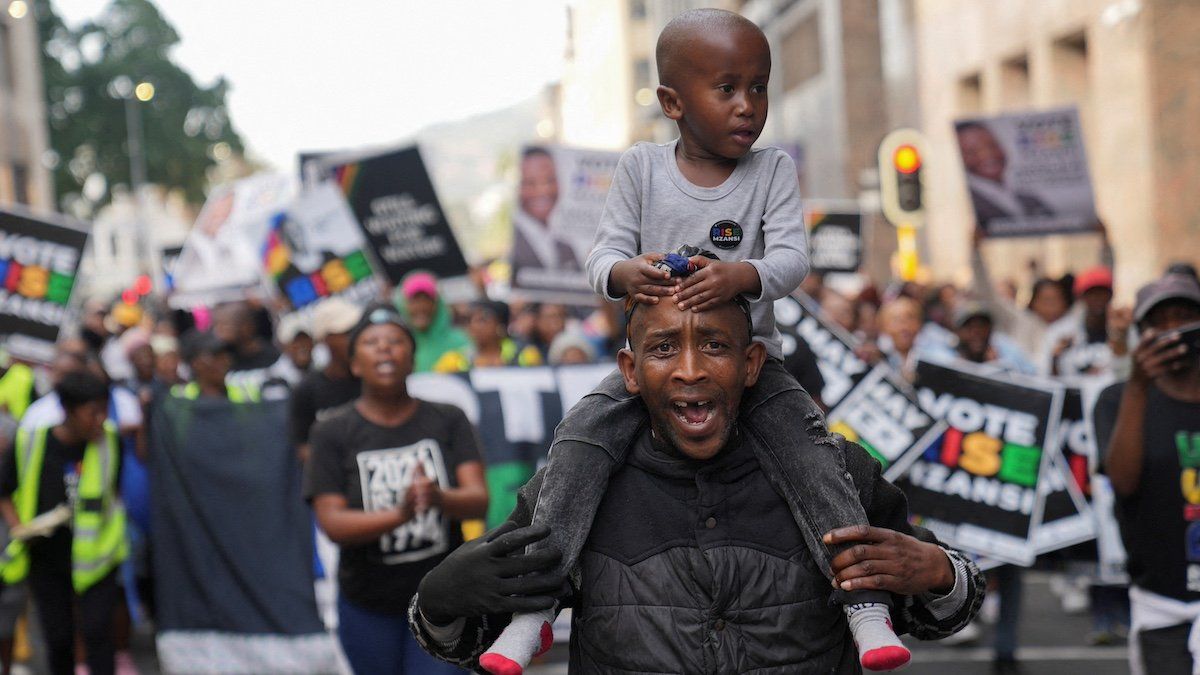South African voters will decide on May 29 whether to give another five-year mandate to the African National Congress, the political party that helped bring about the country’s transition to multi-racial democracy in 1994 and has ruled ever since.
Amid intense scrutiny of the ANC’s 30-year record – especially its failure to address economic problems and an electricity supply crisis – the polls show the party at risk of losing its parliamentary majority. Contributing to its woes is the reemergence of Jacob Zuma, a controversial former president and party leader, who is supporting a new political formation threatening to steal votes from the ANC.
We sat down with Eurasia Group’s Ziyanda Stuurman to learn more about the upcoming vote.
How has the 30th anniversary of the transition to democracy played in the election campaign?
A number of opposition parties have harped on the idea that the ANC hasn’t delivered what it promised at the advent of democracy and that South Africa needs new leaders. They say that if the country is going to change course on unemployment, inequality, and poverty, there is no better time to do it than this year. The ANC, on the other hand, is positioning itself as the defender of democracy and calling on voters to support the people who fought against apartheid and preserve the legacy of Nelson Mandela, the country’s first democratically elected president.
Does the ANC have concrete achievements it can point to from its 30 years in power?
Yes, the party has been touting progress on a range of development indicators. These include increasing the proportion of households with access to electricity from 57% to 89% between 1996 and 2021, increasing the share of households with access to piped water from 44% to 60% between 1996 and 2022, and building 3.4 million low-cost houses between 1996 and 2022.
What do voters think? Why has support for the ANC declined?
One long-running concern is unemployment. The unemployment rate is over 30%, with youth unemployment closer to 60%. The country has struggled to generate jobs for decades, but the problem intensified when Zuma was president from 2009 to 2018, investment slumped, and the economy stagnated.
A more pressing concern at the moment is the crisis of electricity supply caused by corruption and mismanagement at power utility Eskom. The situation has improved somewhat this year, but in 2023 the country suffered frequent blackouts. When the government literally can’t keep the lights on, that’s the type of thing that really sours voter sentiment. Finally, many people have been disappointed with President Cyril Ramaphosa, who assumed office after Zuma resigned following years of allegations of sweeping corruption in his government.
Why this disappointment?
I think there were a lot of unrealistic expectations that Ramaphosa, a successful businessman, would quickly turn the country around. He’s just one man and the ANC is a very big organization. Moreover, he has had to deal with the fallout from crises such as COVID-19 and the war in Ukraine. He has made progress rebuilding institutions that suffered during Zuma’s tenure such as the tax authority and the judiciary. But I think that many people see these issues as far removed from their lives and things like the price of bread and fuel and so on.
Ramaphosa himself has been tainted by allegations of wrongdoing, right? What is the status of the investigation into the alleged fraudulent activities at his Phala Phala farm?
It’s turned out to be mostly a damp squib. Right now there are four suspects on trial for breaking and entering at the farm, but very little has been tied to the president (he was alleged to have covered up the theft of a large sum of money to avoid scrutiny). When the story broke in 2022, his approval ratings suffered, but they have since recovered. I highly doubt that the average person is thinking of Phala Phala as an issue. Ramaphosa is a wealthy man, so people just think, “ok, a rich man got robbed. So what?”
Meanwhile, Zuma has made a comeback. What has been the impact of his new party? And given his legal troubles, can he serve in parliament?
The Constitutional Court has just put the final nail in the coffin for Zuma’s ambitions to get reelected to parliament and becoming president again. It ruled that his contempt of court conviction for refusing to testify in a public inquiry on corruption made him ineligible to stand for parliament. Moreover, the impact of his new party, uMkhonto weSizwe, and its ability to steal votes from the ANC has been greatly exaggerated by the media. Some polls have given it a 14% share of the national vote, which would make it the third-largest party in the country. But there are substantial problems with South African polling, and I don’t think it will obtain anywhere near that share of the vote.
If the ANC does lose its parliamentary majority, what would that mean for the country?
I think the ANC is likely to retain its majority, and if falls short, it’s not likely to be by much. That means the ANC could form a coalition government with one or more small, ideologically aligned parties, which would not have much impact on government policies. In fact, Ramaphosa could probably move faster on some of his priorities in a second term. In a less likely scenario of a much worse showing for the ANC, say a vote share of about 40%, then it would be forced to partner with one of the bigger opposition parties, the Democratic Alliance or the Economic Freedom Fighters. This would force bigger policy changes (the DA is more fiscally conservative, while the EFF is more left-wing) and result in an unstable coalition. I would expect such a government to collapse before the end of its term in 2029, requiring snap elections.
Edited by Eurasia Group Senior Editor Jonathan House.
